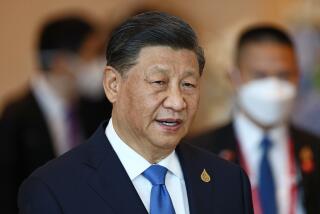China to Join Iraq Arms Embargo
- Share via
BEIJING — China announced Sunday that it will join Western nations in an international arms embargo against Iraq in response to that nation’s invasion of Kuwait.
Beijing’s action came after two days of talks between Chinese officials and visiting U.S. Assistant Secretary of State Richard H. Solomon, who flew here Saturday to discuss the Iraqi invasion, Cambodia and other issues.
Solomon met with Vice Foreign Minister Tian Zengpei and Assistant Foreign Minister Xu Dunxin before flying on to Tokyo on Sunday, according to a Western diplomat who spoke on condition that he not be further identified.
Shortly before Solomon’s departure, the official New China News Agency quoted a Foreign Ministry spokesman as saying that “since China had voted for the U.N. Security Council Resolution 660 against the Iraqi invasion of Kuwait, it will, naturally, not sell arms to Iraq under such circumstances.”
China was a major supplier of arms to both Iraq and Iran during their long war in the 1980s. It has been the third-largest supplier of arms to Iraq after the Soviet Union and France.
Beijing has refused, however, to officially acknowledge its sales to Iraq and Iran, which were sometimes routed through North Korea. For years, Chinese Foreign Ministry spokesmen routinely denied making sales that Western governments said had indisputably taken place.
Nevertheless, China’s announcement Sunday apparently is being accepted as sincere. The Western diplomat who discussed Solomon’s visit described the announcement as China’s “answer” to the American request.
Talks between Solomon and Chinese officials were “constructive, frank and cordial,” the diplomat said.
It is “very important,” he said, that China and the United States be able to “make progress” on issues such as this one, which he described as “a life and death” matter. He said the Chinese response Sunday “plays constructively into the domestic (American) support for the (U.S.-China) relationship, (or) it should.”
Solomon and Chinese officials discussed bilateral U.S.-China relations primarily in “generalities,” the diplomat said. Cambodia was discussed at some length, but he did not reveal details of those talks.
No request was made to Beijing to join in economic sanctions against Iraq, he said. It is difficult for the United States to press for Chinese economic sanctions against a third country when the United States still has economic sanctions in place against China, he said. Those sanctions were imposed in response to Beijing’s violent crackdown on pro-democracy demonstrations last year.
During Solomon’s visit, the Chinese side again raised a request for U.S. sanctions against Beijing to be lifted, the diplomat said.
More to Read
Sign up for Essential California
The most important California stories and recommendations in your inbox every morning.
You may occasionally receive promotional content from the Los Angeles Times.










